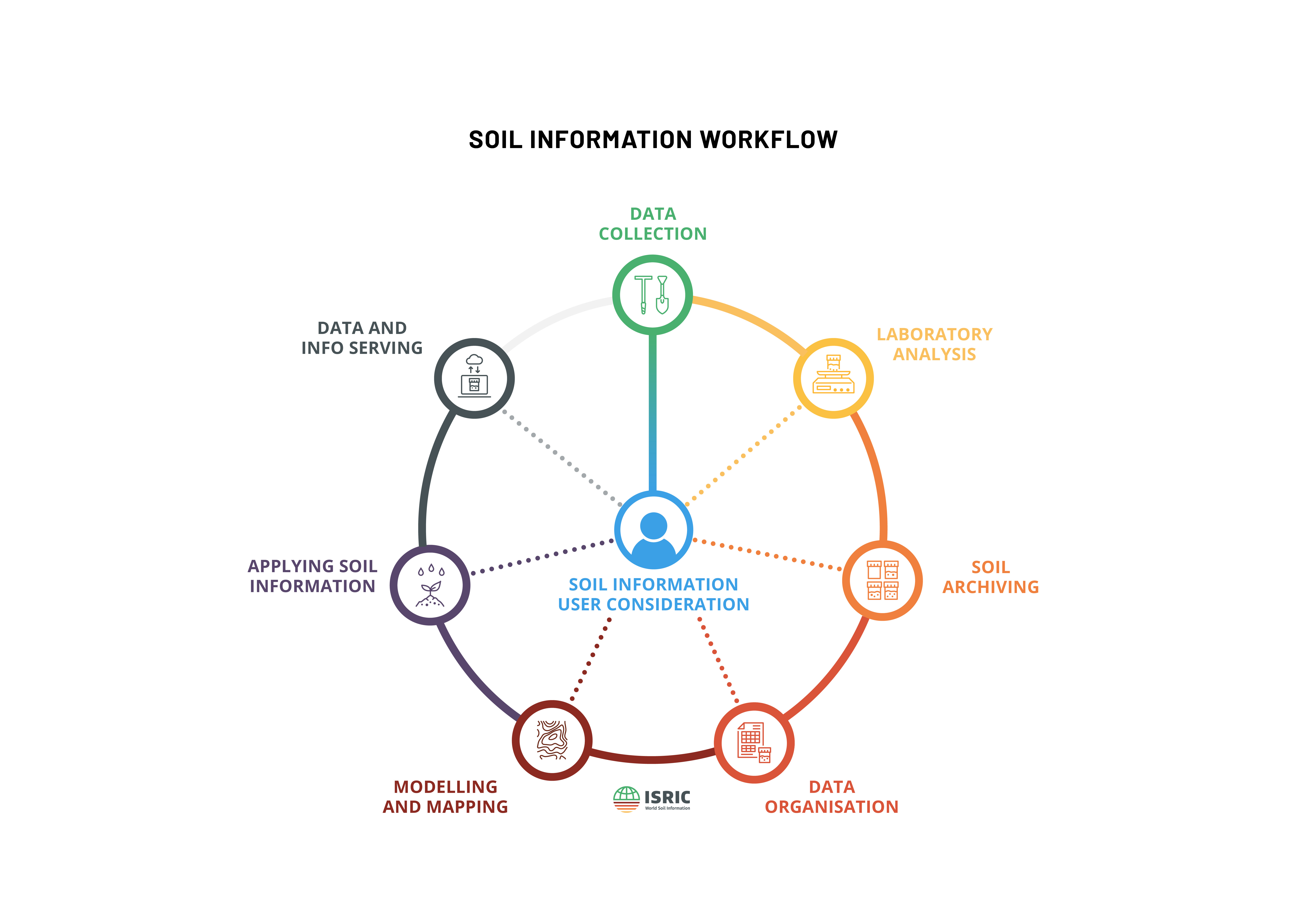A Community of Practice approach to strengthening Soil Information Systems in Africa
In 2022, we began collaborating with our African partners to establish a network of professionals focused on learning, sharing knowledge, and working together to strengthen Soil Information Systems (SIS) in Africa. This initiative resulted in the establishment of a vibrant Soil Data and Information Community of Practice (CoP), facilitated by ISRIC – World Soil Information. The CoP provides soil professionals and researchers across Africa with a platform to exchange insights, collaborate, and effectively utilise SIS.
In an article on Frankwatching, Kirsten Wagenaar from Sense of Community, along with Chrow Khurshid and Silvana Summa from ISRIC, discusses the process of building the CoP, highlighting key lessons learned, challenges overcome, and the broader role of CoPs as engines of sustainable change and innovation.
Click here to access the full article (in Dutch). For English, please see below.
Soil data plays a crucial role in addressing global challenges such as food security, sustainable land management, and climate change. However, effectively collecting, managing, and applying this data remains a significant challenge, especially in Africa, where soil scientists often face limited resources and support.
In recent years, there has been a growing trend in working with Communities of Practice (CoPs)—networks of professionals who learn, share knowledge, and collaborate to solve complex problems. ISRIC – World Soil Information recognised the potential of this approach and, in 2022, began taking the first steps to establish such a learning network. The Soil Data and Information Community of Practice provides soil professionals and researchers across Africa with a platform to exchange insights, collaborate, and better leverage the value of Soil Information Systems (SISs).
In this article, we outline how a structured step-by-step approach was used to develop the concept of the community, transforming a group of individuals into a dynamic network of experts spanning 42 African countries. You will discover the steps taken to build this community, the challenges overcome, and how the approach aligns with the broader trend of CoPs as engines for sustainable change and innovation.
These insights will help you make more informed decisions about integrating Communities of Practice into your daily work and share examples within your organisation about the value of collaboration, networking, and the use of digital tools. Furthermore, they highlight how to avoid a common pitfall: failing to integrate CoPs effectively with the rest of the organisation.
Why a Community of Practice?
A Soil Information System (SIS) is an integrated system that helps with the storage, analysis, management, and dissemination of soil data and information. The steps to design and build a SIS can be described through the Soil Information Workflow (SIW).

For many soil scientists in Africa, SIS is a new concept, particularly in relation to the SIW developed by ISRIC. The SIW outlines all the stages of the process, from assessing user needs to data collection, laboratory analysis, archiving, data organisation, modelling and mapping, application, and serving of soil data and information.
Raising awareness and knowledge about SIW and SIS is significantly more effective when scientists exchange experiences systematically regarding their practice and application of these steps. Facilitating this exchange (digitally) via a CoP that is accessible to a large audience was a logical step.
Raising awareness
Developing the community concept, defining the domain and structure of the community, and identifying team members and their roles initially posed a challenge. As an organisation primarily focused on the applied scientific and technical aspects of soil data, ISRIC recognised the need for expertise in setting up and managing a community.
To address this, ISRIC collaborated with community expert Kirsten Wagenaar. Alongside Emily Toner, who served as ISRIC’s community and communication manager from 2020 to 2023, Kirsten laid the foundation for the community using her structured approach to community development.
Step 1: Research
In the first phase, ISRIC reached out to its network in Africa, particularly soil scientists who were already engaged in soil information systems. One-on-one conversations and meetings were held to introduce and refine the community concept. This input informed the design of a needs assessment survey, which was sent to 126 soil scientists across 28 African countries.
Step 2: Strategy and ambassadors
Based on the survey results and consultations with internal and external stakeholders, an implementation plan was developed. The first step involved creating a group of community ambassadors from various African countries. These ambassadors played a leading role in the CoP and worked closely with the community manager.
The first online meeting with ambassadors took place in October 2023, during which the community's goals, structure, and the ambassador roles were discussed. Feedback from ambassadors provided critical insights that helped refine the initial strategy.
Step 3: Choosing the platform: WhatsApp
Within the WhatsApp community, subgroups were created based on the soil information workflow categorisation (see figure above). Each of these subgroups included at least one ISRIC expert. Although participation in some subgroups eventually decreased (because certain groups did not have enough ambassadors), the groups generated an increasing demand for training. This led to new plans for innovative training methods in 2025.
The combination of a large WhatsApp group that is accessible to all members and smaller subgroups that are relevant but only accessible to specific experts, ensures that the community can facilitate participants at different levels of interest and engagement.
Step 4: Community management
As the WhatsApp group grew in popularity and daily posts increased, it became clear that a full-time community manager was needed. Chrow Khurshid was hired in November 2023 based on her experience in community building. Her first step was to organise one-on-one meetings with ambassadors to align expectations and ideas and discuss local initiatives. This gave her an opportunity to get to know the community through the ambassadors and provided new insights into the community's needs.
As a result, the composition of the group of ambassadors also changed. Some ambassadors stepped down, while new ambassadors from countries that were previously unrepresented in the community were welcomed. Together with Kirsten, Chrow led workshops to prepare this new group of ambassadors for their roles and responsibilities.
A clear communication strategy, implemented by the communications manager, was developed to increase the visibility of the CoP in Africa. This led to an increase in the number of soil scientists joining the community, both on WhatsApp and LinkedIn. Additionally, a general evaluation of the CoP and its sub-communities was conducted. The results of this evaluation were later shared with all members.
Community activities
Starting in February 2024, activities such as meetings, showcase events, joint authorship of scientific articles, and surveys were organised. These initiatives enhanced interaction, fostered collaboration, and built lasting relationships among members.
At the request of members, a scientific review committee was established to support the improvement of articles, proposals, and reports. Daily updates, fieldwork photos, and Q&A sessions were also shared via WhatsApp. To boost engagement and reward contributions, an “Ambassador of the Month” campaign was launched on WhatsApp and LinkedIn.
Step 5: Integration with the organisation
In 2024, the goal was to further integrate the CoP into ISRIC activities and align it with other initiatives in Africa. Lessons learned included:
- The importance of tailored communication tools based on geography.
- The need for significant efforts to maintain active engagement.
- The value of informal leaders (community ambassadors) to stimulate interaction within subgroups.
- Internet quality and different time zones as a limiting factor for online participation.
Future plans
Within a year, the CoP expanded to 735 members on WhatsApp and 816 followers on LinkedIn, spanning 42 African countries. The goal is to reach the remaining 12 countries and strengthen networks further.
Sustained effort is critical for a CoP to thrive. By experimenting with various activities and approaches, both the facilitating organisation and the members gain deeper insights into the community's potential.
We hope these insights inspire you to invest in knowledge-sharing through Communities of Practice, while fostering shared ownership and autonomy among participants for lasting impact.
